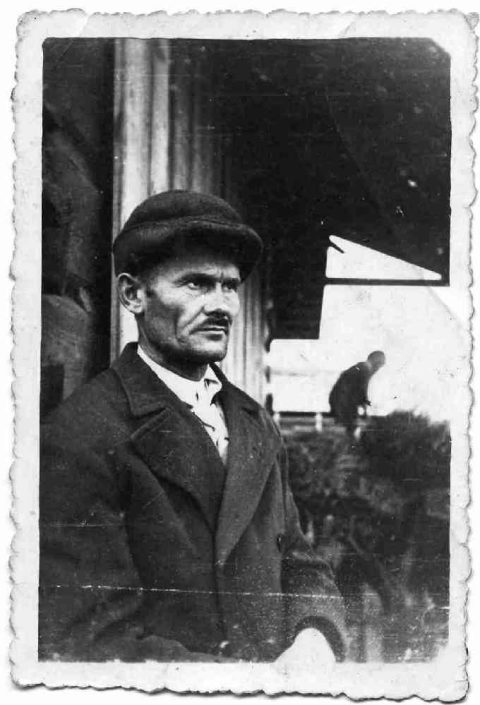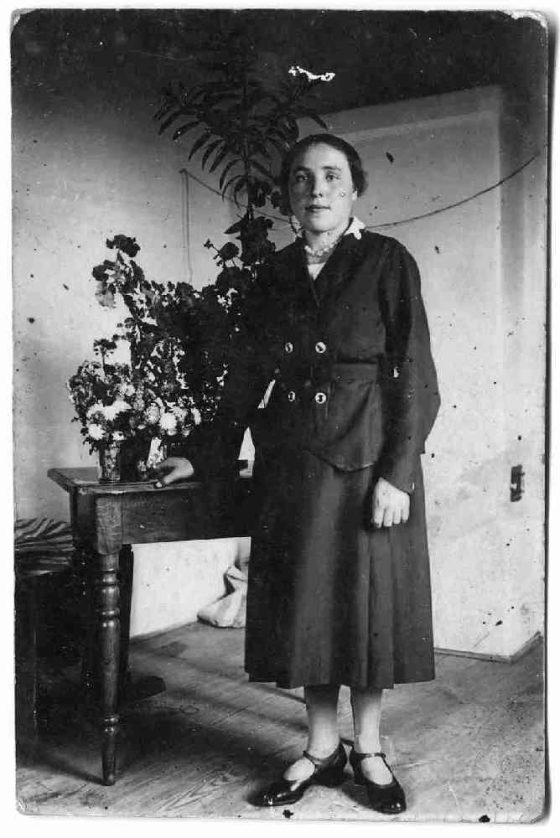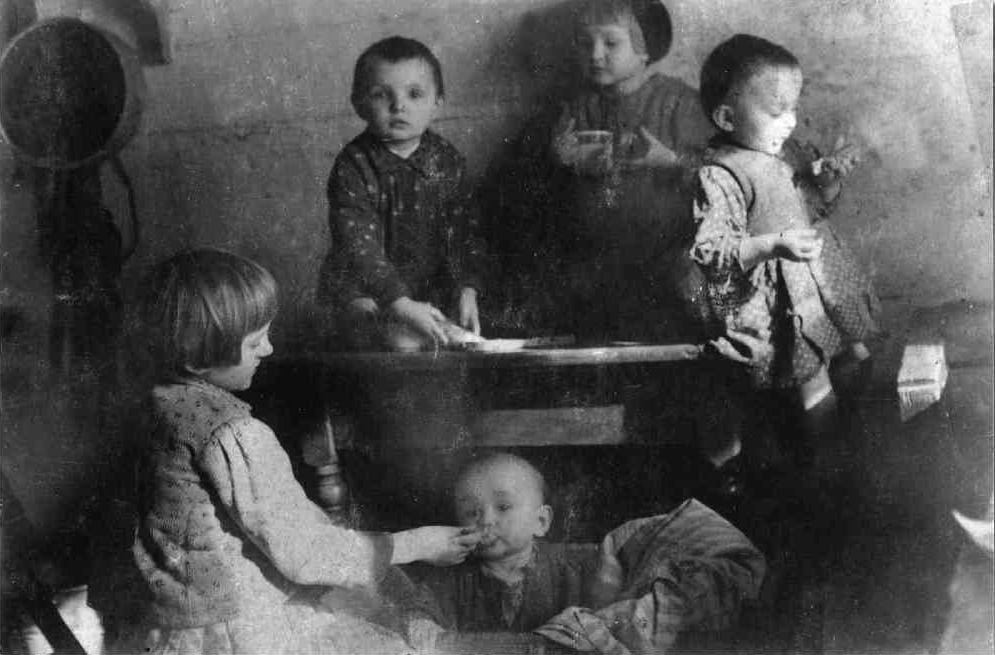BIOGRAPHY
Józef Ulma (2nd March 1900 – 24th March 1944)
He was the son of Martin and Franciszka (née Kluz). His parents had a three-hectare farm, where he helped since he was a young boy. He completed a four-grade primary school and, in 1921, was called up for military service. In 1929, he enrolled at an agricultural school in Pilsen, where he graduated with excellent results.
He set up the first fruit tree nursery in Markowa and soon began to make a living from the sale of saplings. It was probably thanks to him that grafted apple trees appeared in the area. In addition to gardening, Józef Ulma promoted fruit and vegetable growing. He was a pioneer in beekeeping and silkworm breeding. His creativity and commitment in this area were rewarded at the Przeworsk District Agricultural Exhibition, organized by the District Agricultural Society in 1933.
He was a man of broad horizons: part of his book collection, bearing the ex-libris “Home Library – Józef Ulma”, has been preserved to this day. His books include “The Electrical Engineering Handbook”, “Photography Handbook”, “The Use of Wind on the Farm”, and a publication on the native people of Australia. He subscribed to the periodical “Wiedza i Życie” (“Science and Life”). He constructed a bookbinding machine and a household wind turbine, which made him the first in the village to light his house with electricity rather than a paraffin lamp.
Józef’s greatest passion was photography. At first, he used a self-assembled camera, but with time he started using professional equipment, thanks to which he documented the everyday life of the inhabitants of Markowa. Many of his photographs have been preserved until today – some are presented here.

He was a keen social activist. He was active in the Catholic Men’s Youth Association, and later in the Union of Rural Youth of the Republic of Poland “Wici”, where he held the post of librarian and the Chairman of the Agricultural Education Committee at the District Board. For a time, he was also the manager of the Dairy Cooperative in Markowa.
After his marriage to Wiktoria, 12 years his junior, and the birth of their subsequent children, he decided to move with his family to the eastern part of the Lwów voivodship, where landed estates were being parcelled out. In 1938 the Ulmas bought 5 hectares of chernozem – good soil in Wojsławice, near Sokal. However, the move did not happen due to the outbreak of the war. In September 1939, Józef took part in the defense war.

Wiktoria Ulma née Niemczak (10th December 1912 – 24th March 1944)
She was born as the seventh child of Jan and Franciszka née Homa. When she was six years old, her mother died. A year before her marriage, also her father orphaned her. Like Józef, she was socially involved. She performed in the village theatre and attended courses organized by the Folk University in the village of Gać.
She married Józef in 1935, and children soon came into the world: Stanisława (born 18 July 1936), Barbara (born 6 October 1937), Władysław (born 5 December 1938), Franciszek (born 3 April 1940), Antoni (born 6 June 1941) and Maria (born 16 September 1942). At the time of her death, she was in advanced pregnancy with her seventh child. The delivery began in the dramatic situation of execution.

The Crime in Markowa
Before the outbreak of World War II, at least 120,000 Jews lived in the Podkarpacie region. Among almost 4,500 inhabitants of Markowa, there were about 120 people of the Jewish faith. Their houses, scattered across the village, did not form a compact cluster. There were three houses of prayer in Markowa but the Jewish residents went to the synagogue in Łańcut for major celebrations. The Jews of Markowa were mainly engaged in trade, only a few were farmers.
Even before the war, Józef Ulma had been on very good terms with the Jews. A few Jewish families lived next door to him, and he traded the vegetables he grew with others.
The wartime terror soon began to take its toll. On 23 November 1939, the regulation that all Jews over the age of 10 must wear armbands with a Star of David on their arms came into force. Other restrictions soon followed: compulsory work, a ban on using means of transport, or leaving the place of residence without permission. Jews were placed in ghettos or sent to labour camps.
In 1941, the Germans decided on a “Final Solution of the Jewish Question” and the fate of the Jews became tragic. Almost 6 million European Jews died in the extermination camps as a result of executions, being murdered in gas chambers, or from exhaustion. By the end of 1942, German Reich functionaries had murdered almost 1.3 million Jews from the Warsaw, Radom, Lublin, and Cracow districts, more than half a million from the Galicia district, and about 130,000 from the Bialystok district. In 1941, unlike in the occupied countries in Western Europe, in the Polish territories, the Germans introduced the death penalty for any help given to the Jews. About a thousand Poles were murdered because of this.
Operation “Reinhardt,” which had been in progress since March 1942 and aimed at murdering all the Jews in the General Governorate and the Bialystok District, began to be implemented in Łańcut and its surroundings in late July and early August 1942. The Germans imposed a ban on Jews staying in the Markowa area and began deporting them to the labour camp in Pełkinie and then to the extermination camp in Bełżec.
Some of the Markowa Jews then asked the Ulmas for help. Initially, Józef helped them to build dugouts on the outskirts of the village. We know of a family of four, the Ryfkis, whom he helped to build a shelter in a ravine near the stream. However, this was not an effective means of survival, as the German gendarmes, together with the police, carried out ad hoc searches for Jews: both in the village and in the surrounding area.
On 13 December 1942, the Germans ordered the mayor of Markowa to organize a search operation. Before noon, the mayor informed the villagers about the planned action, thus enabling those in hiding to secure their hidings better. At least 26 residents, most forced, found 25 of the approximately 54 Jews in hiding.
The captives were locked up in the so-called communal detention center, located at the main crossroads in the village. On 14 December 1942, the German gendarmerie from Łańcut shot them all. Despite this action, 29 Jews continued to hide in Markowa after December 1942, 21 of whom lived to see the end of the occupation.
On 24 March 1944, eight Jews were murdered along with the Ulma family. The day of the death of the Ulma family from Markowa has been celebrated since 2018 as the National Day of Remembrance of Poles Saving Jews under the German occupation to honor all those who, despite the great danger, brought help to the Jewish population.
Jews were hidden in Markowa by several families, but the largest group found refuge in the Ulmas’ house, most likely in December 1942. Those were the Ulmas’ acquaintances from Łańcut: Saul Goldman with his sons Baruch, Mechel, Joachim, and Moses, and the Ulmas’ neighbours from Markowa and the daughters of Chaim Goldman, a relative of the above-mentioned Saul, Gołda Grünfeld and Lea Didner. The latter had her little daughter named Reszla with her.
Saul Goldman was about 70 years old and was a cattle trader. He lived in Łańcut but was well known in Markowa, where he often came on business. Lea and Gołda’s parents were Chaim and Estera Goldman, who were the few Jews who were both farmers and traders running a shop in Markowa.
We know that with the Goldmans, Józef Ulma was involved in tanning leather, which he sold to earn a living. It was possible because the location of the Ulmas’ house was on the outskirts of the village. The Jews in hiding probably paid for their upkeep; however, there is no indication that the Ulmas helped them in return for financial gratification. Near the end of the German occupation, Gołda Grünfeld still possessed some gold jewelry, which German gendarmes found with her corpse.
However, the large quantities of food that Wiktoria bought drew the attention of neighbours and gave a hint that there might be more than just family members in their home. Who reported the Jews to the Germans and when remains a mystery. Probably, it was Włodzimierz Leś, a constable of the Polnische Polizei, a navy-blue policeman from Łańcut. According to the Underground’s findings, he was an exceptionally zealous collaborator with the German occupiers. Documents also give some evidence that before the Goldmans turned for help to the Ulmas, it was Leś who, for money, helped them to hide in Łańcut and later drove them out, keeping nonetheless their property.
On the night of 23rd /24th March 1944, five gendarmes and four to six navy-blue policemen arrived in Markowa. The group was commanded by the chief of the Łańcut gendarmerie, lieutenant Eilert Dieken.
Three Jews were shot during sleep, and the others shortly afterward. Józef Ulma and his pregnant wife Wiktoria were forced out in front of the house. Then, after having discussed the matter with his subordinates, Dieken ordered to shoot also the children. Within a few minutes, seventeen people lost their lives (including the baby whom Wiktoria started giving birth to at the moment of the execution).
After the massacre, the Germans looted the farm and the items belonging to the murdered. The villagers were forced to bury the dead. Two pits were prepared: one to bury the Ulmas and another for the Jews. Finally, the perpetrators held a libation at the execution site. In January 1945, the bodies of the Ulma family were exhumed and moved to the local parish cemetery. Two years later, the remains of the murdered Jews were unearthed and buried in the Jagiello cemetery, together with the victims of the massacre of 14 December 1942.
The only gendarme tried for the crime in Markowa was Josef Kokott. As a result of the trial, which took place before the Regional Court in Rzeszów in 1958, he was sentenced to death, which was later changed to life imprisonment. After a change in the law, the sentence was reduced to 25 years imprisonment. He died in the Bytom prison, in 1980.
Włodzimierz Leś, a policeman, was tried and punished by the Polish Underground State. On 11 September 1944, the Polish Underground carried out a death sentence on him. The gendarme commander, Eliert Dieken, became a policeman in Esens, in Lower Saxony, after the war. He was already dead when, in the 1960s, the public prosecutor’s office at the Dortmund Regional Court opened an investigation into crimes committed by the German gendarmerie in the occupied district of Jarosław. He died in 1960 as a respected citizen. Neither he nor the other murderers ever met justice.
In 1995, Wiktoria and Józef Ulma were awarded the “Righteous Among the Nations” title. In 2010, they were honored with the Commander’s Cross of the Order of Polonia Restituta by the President of the Republic of Poland, Lech Kaczyński. The poor couple from Markowa became patrons of many schools and streets. Their name is also given to the only Museum of Poles Saving Jews during World War II in Poland, which opened in Markowa in March 2016.
Source: the Institute of National Remembrance (IPN)